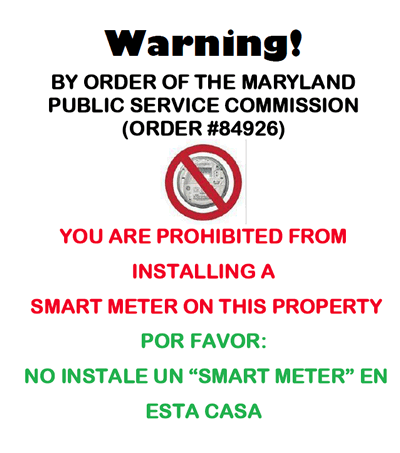Lower fees and protections for opting out of smart meters proposed
By Jeremy Bauer-Wolf
Some Marylanders are apprehensive that a digital, smart meter system measuring their electricity use violates their privacy and will heap on costs to electric bills. They are supporting legislation that would allow an inexpensive opt-out option.
Sen. Delores Kelley, a Baltimore County Democrat, told the Senate Finance committee Tuesday that SB 880 offers a solution both satisfying to constituents and fair to the electric companies.
Smart meters transmit data to the utilities, providing more accurate readings, the companies say. They remove the need for meter readers, and companies are gradually replacing the old, analog units, unless a resident explicitly opts out.
In Maryland, the Public Service Commission recently dictated that beginning July 1, customers who elect not to have a Smart Meter would pay a one-time fee of $75, with the utility companies charging additional monthly fees of between $11-$17.
Fees would be based on actual costs
Kelley’s bill would mitigate those fees considerably, she said. Consumers would be only be forced to pay whatever costs are associated with either an analog or smart meter as a form of cost recovery for the utilities.
That figure has not yet been calculated, but would be lower than the arbitrary one the PSC has mandated, Kelley said.
She urged the committee to add an amendment to the bill that would ask the PSC to perform an analysis and develop cost projections for each type of meter.
“Such high fees mean that low- and moderate-income consumers will not be able to exercise their choice to opt out of a smart meter if they have … concerns,” Kelley said.
Customers opt out for numerous reasons, according to Jonathan Libber, a former environmental attorney and president of Maryland Smart Meter Awareness, an organization which aims to spotlight the problems of smart meters.
Oft-cited concerns are effects on health and collection of an unnecessary amount of data on energy use,
Health effects not tested
 Dr. Anita Moore, who testified as a representative of Maryland Smart Meter Awareness, likened the low-level radiation the smart meters emit to emissions from microwaves, which also pose health risks, she said.
Dr. Anita Moore, who testified as a representative of Maryland Smart Meter Awareness, likened the low-level radiation the smart meters emit to emissions from microwaves, which also pose health risks, she said.
“Utilities can’t guarantee the safety of smart meters,” Moore said. “They’ve avoided doing any kind of health study on it, suggesting maybe they’re afraid of seeing the results.”
The FCC has published a FAQ on its website that suggest the levels of radiofrequency radiation encountered by the general public are generally too infrequent and too low to be harmful.
Moore said these statements are invalid because the FCC is not a health organization.
Ruth Eisenberg, treasurer of Maryland Smart Meter Awareness, raised the privacy concerns. She noted that though Maryland’s smart meters are not sophisticated as other states’, she said we’re only “a software upgrade away” from utilities being able to collect hordes of data on when the home is occupied, whether the occupants are asleep or awake, and the types of appliances and medical equipment they are using.
Non disclosure
Kelley’s bill would prevent utilities from selling or disclosing data to any third party without a customer’s written consent, except in the case of preparing that customer’s bill or “to support consumer choice.”
The PSC would hear complaints of privacy violation and could deem companies pay up to $1,000 in damages to the affected customer.
The bill also requires utilities to provide written notice to customers about where smart meters would be deployed. Customers would have 60 days to opt out of the smart meter system.
An almost identical piece of legislation, SB 280, is being sponsored by Sen. Verna Jones-Rodwell D-Baltimore City, and was heard in conjunction with Kelley’s at Tuesday’s hearing.

MarylandReporter.com is a daily news website produced by journalists committed to making state government as open, transparent, accountable and responsive as possible – in deed, not just in promise. We believe the people who pay for this government are entitled to have their money spent in an efficient and effective way, and that they are entitled to keep as much of their hard-earned dollars as they possibly can.


